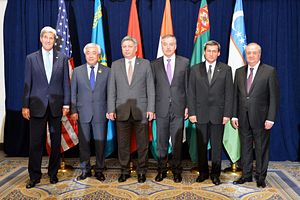Weekend reads:
An Interview in Kazakhstan: Just in case you thought the meritocracy was swiftly cleaning out “the swamp of public administration with an influx of young, talented people” in Kazakhstan, this piece by Nikolay Shevchenko in the New York Times Magazine will give you a dose of reality. More specifically, a glimpse at the odd and robotic kind of “meritocracy” at play in Astana (and elsewhere, to be fair):
There were 50 candidates, and the entire interview consisted of two questions. So much for merit.
Russia Losing Ground Across Central Asia: In a recent article for the Jamestown Foundation’s Eurasia Monitor, Stephen Blank argues that Russia’s grasp on Central Asia is slipping. He notes that Russia’s decision to downsize its presence in Tajikistan “unmistakably flies in the face of Russia’s escalating rhetoric about the threat from the IS in Central Asia and Afghanistan” and its economic troubles at home have made Moscow a more unreliable partner. Case in point, perhaps, is the recent revocation of an agreement between Kyrgyzstan and Russia for several important hydropower projects.
Russia is nonetheless a long way from being significantly overshadowed politically in the region–even by China. Watch this recent video clip from RFE/RL in which they talk to a local living near one of the now stalled and deserted dam projects. In contemplating the possibility of a Chinese investor taking over the project, he says, “Russians would be better, we can communicate with them easily, we can understand the language.”
Another dynamic that may contribute this overall seeming Russian retreat is the very real migration of ethnic Russians out of Central Asia. Bruce Pannier took note of a report from RFE/RL’s Kazakh Service that said in the first nine months of 2015 “some 19,000 Russians left Kazakhstan to take advantage of the Russian government’s program to resettle ethnic Russians still living in other former Soviet republics.”
The West’s Relations with Central Asia: Voice of America’s Navbahor Imamova recently conducted an excellent and wide-ranging interview with Luca Anceschi of the University of Glasgow. One takeaway: despite the fact that the United States and the EU have increased bilateral discussions with regional states, there has been very little progress and if anything, the United States’ influence in the region has decreased. Anceschi points out that it doesn’t matter how often the sides meet, “what matters is the issues that are on the table.” Do yourself a favor and listen to the whole thing this weekend; they get into questions of stability, authoritarianism, elite politics, extremism and more.

































